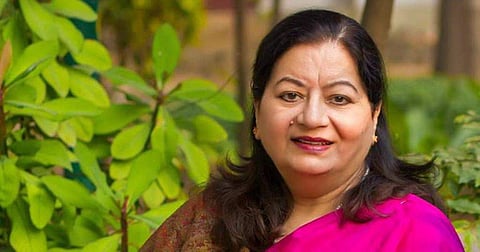

The advent of COVID-19 has opened up all the fault lines of the pre-pandemic way of thinking, learning, working and living, said Jamia Millia Islamia Vice-Chancellor Prof Najma Akhtar. "The post-COVID world will be very different and it will redefine every sphere of human life. This requires bringing together all human capabilities in the form of various interdisciplinary knowledge and practices. Therefore, this National Education Policy (NEP) has been introduced at a very appropriate time. Its multidisciplinary status will be tested right now," she added. Prof Najma Akhtar was speaking at the Conclave on Transformational Reforms in Higher Education alongside Prof M K Sridhar, who was a member of the committee that drafted the NEP and Vice-Chancellor of English and Foreign Languages University (EFLU), Hyderabad, Prof E Suresh Kumar in a session chaired by UGC Chairman D P Singh.
Speaking about the new disciplines and exponential growth of knowledge in the 21st century, Akhtar said, "Such problems have emerged that require a multidisciplinary approach to resolve and tackle. The NEP takes care of this in a holistic manner. The world is undergoing rapid changes in the knowledge landscape which are predominantly scientific and technological in nature. With the rise in Big Data, Machine Learning, Artificial Intelligence and the demand for STEM subjects integrated with Humanities and Arts will give rise to a new form of work that will require learners to be equipped with a new combination of knowledge and skills instead of separate knowledge of Science and Humanities."
Talking about how the present education system focuses more on theoretical knowledge with a lesser emphasis on skills, Prof Kumar said that more emphasis is laid on rote learning and scoring marks. "Honing of skills have taken a backseat. Some of the colleges have become air-conditioned poultry farms," he said. He stated that the NEP has addressed all problems that arise out of a theory-focused education. "Students are pursuing one course after the other with no proper goal. Should we be happy that India has a majority of youngsters or should we be unhappy that some of them are unemployable even with a first-class degree? Students should be the strength of the country and not a burden," said Kumar. The new NEP will provide abundant flexibility and will create several job opportunities for multidisciplinary combinations, he added.
Since a majority of Indians are multilingual, their brains have enhanced cognitive flexibility, said Kumar. Citing the findings from EFLU's Multi Leela, a 4-year project in collaboration with British Council, University of Cambridge and University of Reading, he said, "Children who learn in the same medium of instructions as the language spoken in their homes will perform better in numerous and cognitive tasks. The NEP is right in making regional language compulsory at the school-level and imparting education in regional language up to class 5. With a little support, Indian youth can be converted from job seekers to job providers."
While there is a need to develop global citizens, who have a global vision and concerns, there is also a need to stay connected to the roots, Singh said. "The NEP focuses on how to inculcate the values of Indian culture and be responsible citizens while also thinking about global development. This is what makes it futuristic." He said the policy also highlights equity and inclusion. "By 2030, one large multidisciplinary higher education institution will come up near every district," he stated.
Introduced after deliberations that last five years, the NEP's journey was highlighted by Sridhar. He said, "The aspirations of the people is very important to be considered while framing any policy. The committees did a huge consultation with all the stakeholders with a bottom-up approach that was participatory, inclusive, multidimensional." He stated that the policy was consulted with 1,10,623 villages, 3250 blocks, 962 urban local bodies, 406 districts, 29 states, 31 ministries, 76 MPs before it was announced on July 29.
